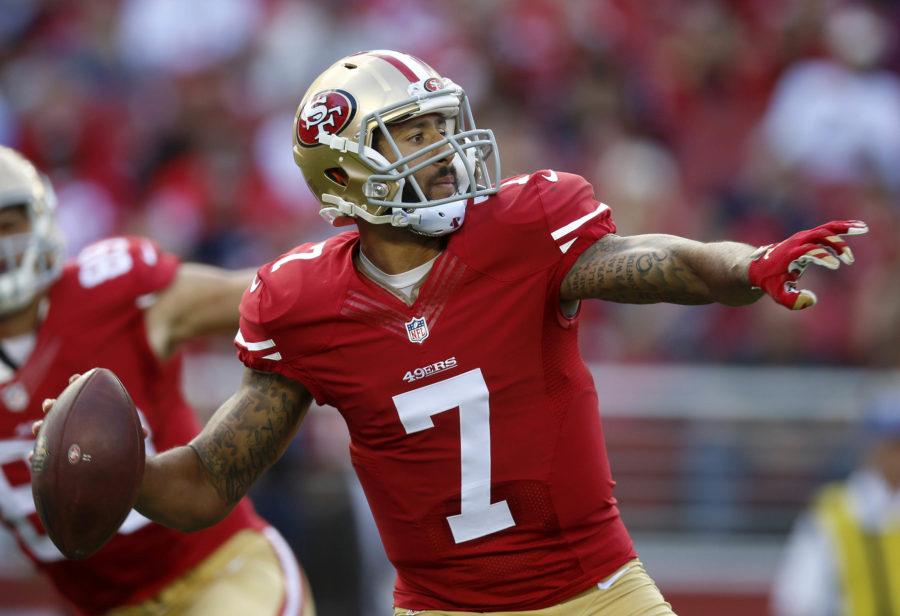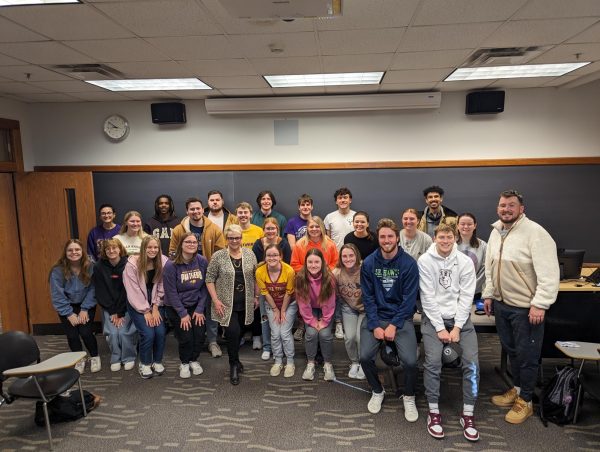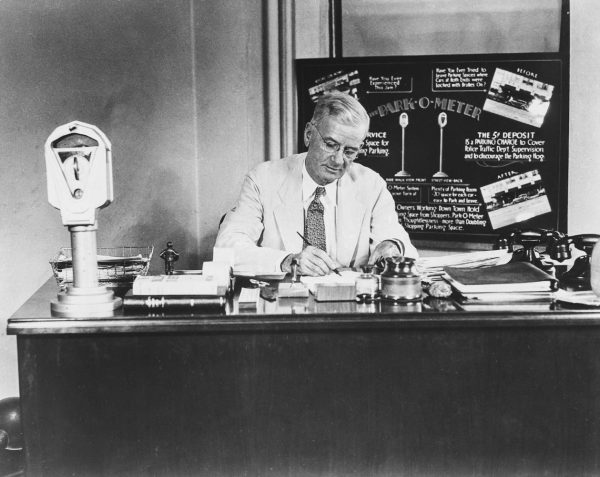UNI AD weighs in on Kaepernick
Colin Kaepernick throws a 72 yard touchdown pass against Baltimore Ravens on Sunday, Oct. 18th. Kaepernick refused to stand for the national anthem prior to the preseason matchup against the Green Bay Packers Aug. 26. Green Bay won the game 21-10
Sep 12, 2016
On August 26, San Francisco 49ers quarterback Colin Kaepernick made headlines as he sat down during the national anthem before a preseason game against the Green Bay Packers. Kaepernick explained his reasoning in an interview with NFL Media, saying, “I am not going to stand up to show pride in a flag for a country that oppresses black people and people of color.”
UNI athletic director David Harris weighed in on Kaepernick’s protest. He offered advice to student athletes who might feel the need to make similar protests here at UNI.
“I think because our student athletes are so visible – they’re well known, they represent our community – I think it’s important that we ensure that they’re really thoughtful about what it is that they’re doing and the reasons that they do it,” Harris said. “We want to make sure that they understand, ultimately, if they take a stance that will be determined to be controversial by other people, then are they ready to stand up to what that might mean to them?”
Kaepernick’s refusal to stand has garnered a wide array of both support and criticism across the country. Harris expressed support for Kaepernick, citing the rights afforded him by the U.S. Constitution.
“I believe that, as a citizen, he certainly has a right to be able to protest if he feels that there are things in this country that he has an issue with,” Harris said. “The Constitution protects his right to be able to non-violently protest and bring attention to that particular issue. I think if you look at things that have happened in our country over the past several months and the past year – just looking at this past summer – then you can certainly see that there are issues between people of color and the police in various communities throughout the country.”
Meredith Miller, junior public relations major, also recognized Kaepernick’s right to protest but thought that he went about it the wrong way.
“I felt like he kind of disrespected a lot of the rights that he was given in this country,” Miller said. “We have the right for free speech and I totally respect all of his opinions […] I mean, this country was founded on free speech, so he can do whatever he wants. But, at the same time, he should respect our country.”
Jamison Whiting, senior philosophy and political science double major, plays for UNI’s football team as a defensive back. He said he was surprised to learn that there is an additional, unsung verse of the Star-Spangled Banner that contains racist lyrics.
“I was completely blown away. You know, I thought it was what we sing – that was the national anthem,” Whiting said. “That really changed my perspective on the whole thing. Before, I was like, ‘Maybe [Kaepernick’s protest] was disrespectful; it could have been taken disrespectfully. In the national anthem, there’s nothing in it that seems racist or anything – it’s supposed to be American.’ But then after reading the whole thing, I’m like, that’s not even subliminally racist – that’s blatantly racist.”
The lyrics in question appear in the third stanza of the song:
“No refuge could save the hireling and slave/
From the terror of flight or the gloom of the grave.”
Despite the fact that such lyrics appear in an omitted verse of the song, the national anthem remains a strongly patriotic symbol for many Americans.
“A lot of veterans find [the national anthem] to be something that’s really important,” said Beth Johnson, freshman English teaching major. “I know my dad’s a veteran and when I was growing up, there were certain ways that you handled the national anthem, and if you didn’t, that was really offensive.”
Johnson went on to explain that while she does support Kaepernick’s motives, she disagreed with how he carried out his protest.
“His cause, what he’s trying to say, is not inappropriate. That does need to be brought up, and the fact that a public figure did so is fantastic. It brings attention,” Johnson said. “But during the national anthem? Do it in a press conference. Do it at a time where people are going to listen […] Don’t do it at a time that’s supposed to be for everyone in the country.”
Harris said he thinks that Kaepernick’s protest doesn’t necessarily signify a lack of love for the United States.
“People who stand during the national anthem and people who decide to protest can both have a great love for our country,” Harris said. “If you decide you care enough to take an unpopular stance, that’s an indication of love.”
Gwenne Berry, UNI’s chief diversity officer, urged students to seek administration before deciding to engage in protest.
“While protest is useful in some situations, it usually is implemented when oppressed or marginalized parties believe they have no other recourse,” Berry said. “At UNI, the administration has been responsive to student concerns.”
The San Francisco 49ers play the Los Angeles Rams tonight at 9:20 p.m. on ESPN. With a game following so closely to the 15th anniversary of the Sept. 11 terrorist attacks, many are waiting to see whether or not Kaepernick will stand for the national anthem.

















